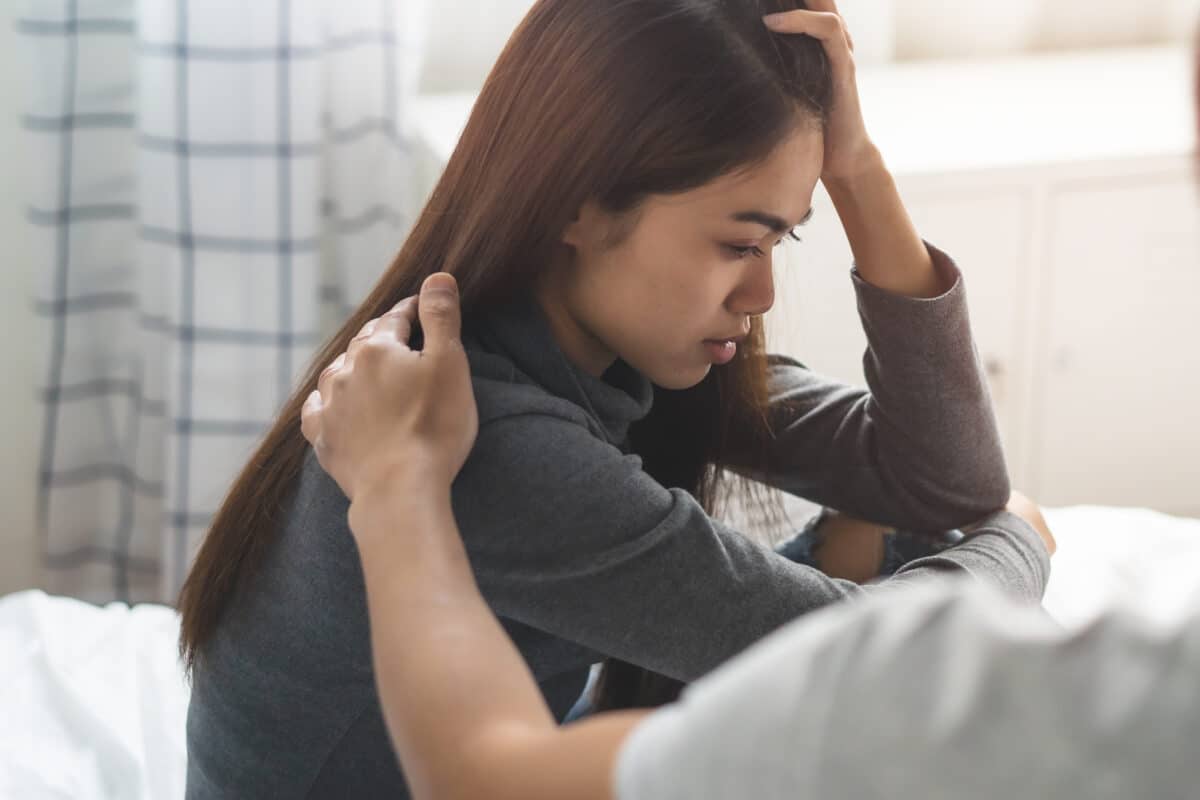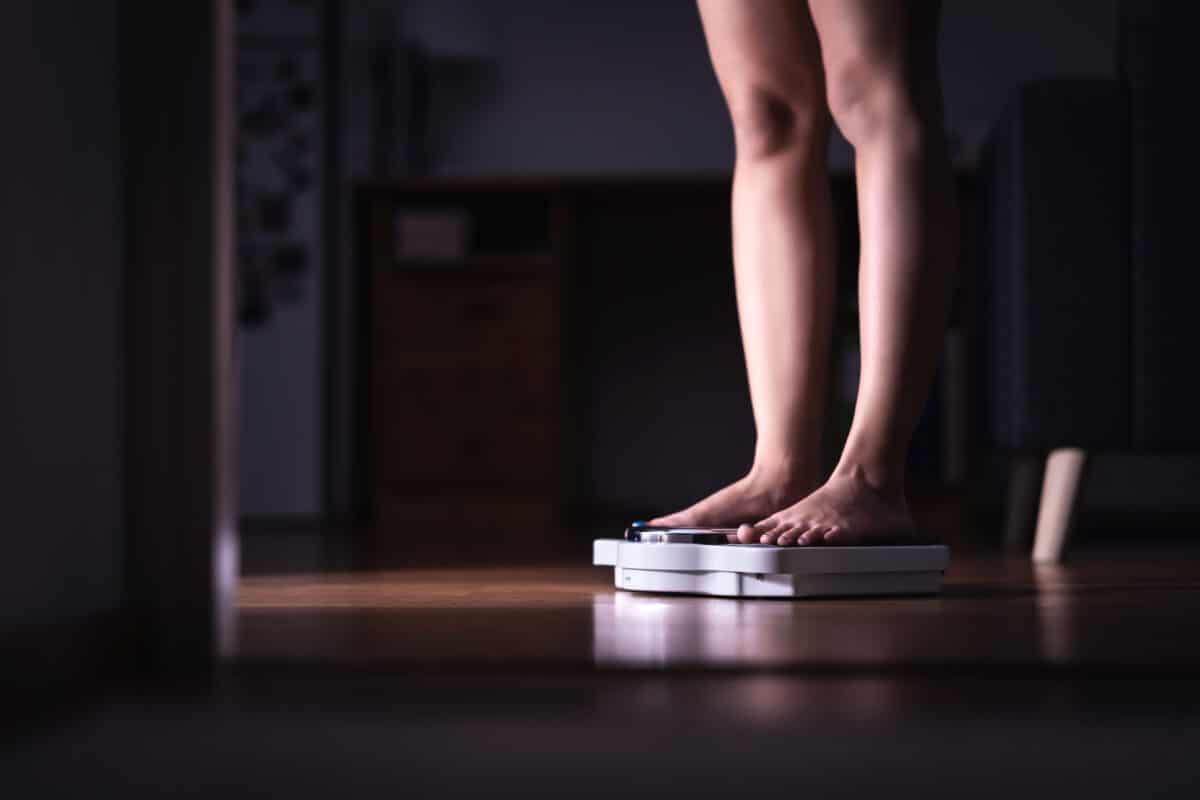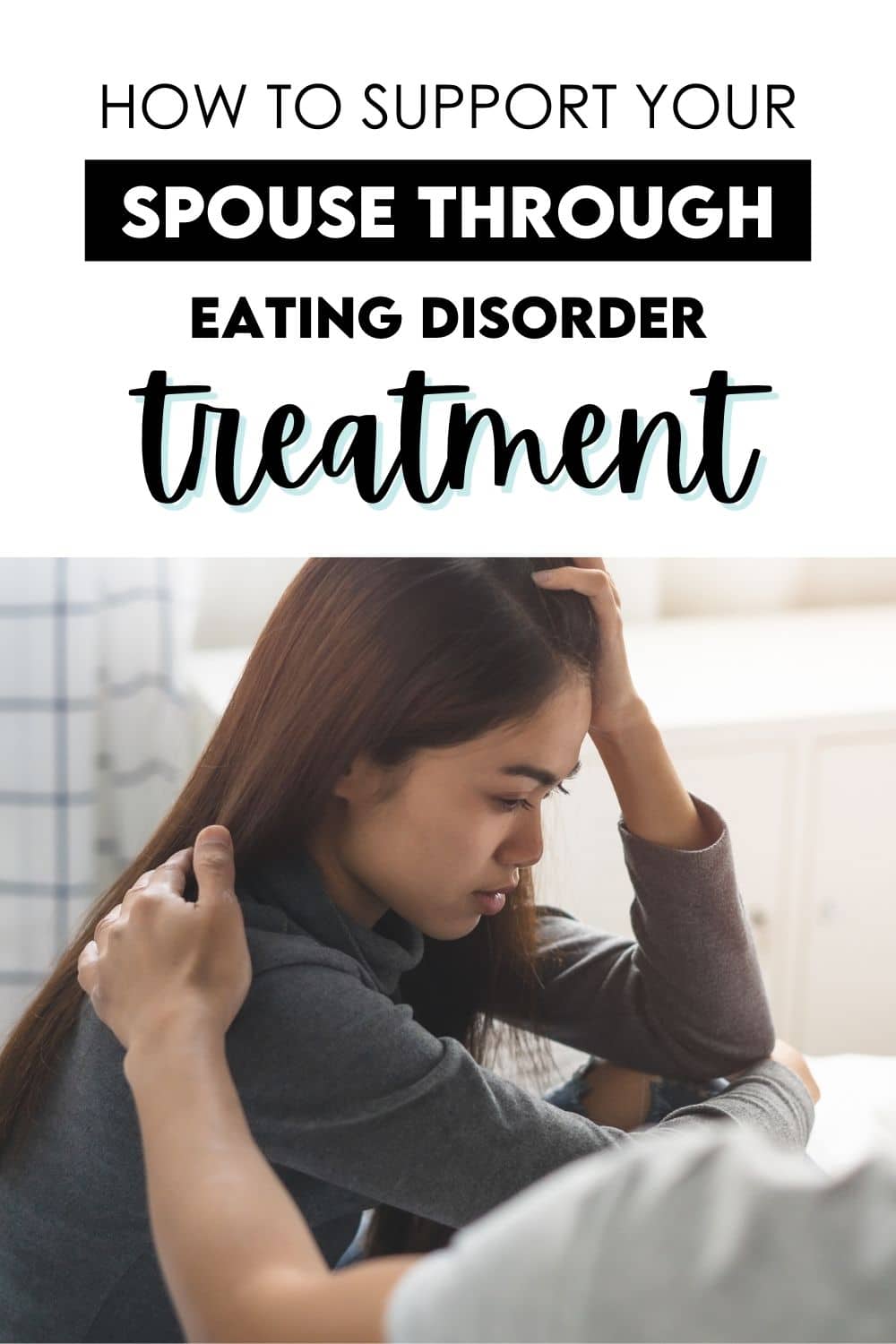Eating Disorder Treatment & Support
If someone you love is struggling with an eating disorder, or if you yourself are struggling, you are not alone. Unfortunately, eating disorders are very common, affecting around 9% of Americans.
It can be scary to struggle alone, and alarming to watch someone you love struggle. The burden of this disorder can weigh you down, but shouldn’t make you feel helpless. Luckily, there is so much help, information, and research that can help lead you or your loved one to eating disorder recovery.

Finding the right kind of eating disorder treatment and help is crucial to making a full ed (eating disorder) recovery. On that note, the earlier an eating disorder is identified, the better. Additionally, the chance of eating disorder recovery is greater the earlier it is detected.
Within this post, we created a complete guide with ideas and resources you need to learn how to help someone with an eating disorder, find the right eating disorder treatment for recovery, and how to deal with an eating disorder if you are the one struggling.
How to KNow if Eating Disorder Treatment is Needed
Our society is hyper-fixated on body image and dieting. As a result, it can be difficult to know when a line is being crossed into disordered eating. An eating disorder usually goes beyond just wishing you could lose 5 pounds. Instead, it is a mental health issue that causes an obsession with weight, food, and body shape.
It is a difficult position trying to get help for someone that you think has an eating disorder. On the one hand, you don’t want to strain your relationship by making them feel bad or ashamed that you are concerned. However, you love them and want a life of wellness and happiness for them.
Eating disorders cause a lot of emotional distress and physical suffering. Despite this, those struggling with an eating disorder often still reject help or deny that a problem exists. The shame and inner turmoil they feel can cause them to try to hide their issues and mask their distress. As with many mental health issues, eating disorders can be an embarrassment or point of shame, causing people who suffer to turn away from help to hide the depth of their problems.
The best way to know if an eating disorder exists is to talk with a doctor. Another helpful tool is the Eating Attitudes Test.
What causes Eating Disorders
The exact cause of eating disorders is unknown, but ample research suggests they most often coexist with psychological and medical issues. Biological factors, such as a family history of eating disorders and hormonal changes, can contribute to the likelihood of developing an eating disorder.
Psychological factors are also commonly seen with eating disorders. These include things like low self-esteem, depression, anxiety, emotional control, and substance abuse.
Finally, social factors may also play a role. Bullying, abuse, trauma, and even struggling with school, sports, or other activities can play a role.
For many, food becomes a way to exert control over an aspect of their life. Starting out, it may just be eating more or less than usual, but it then can spiral into a much bigger issue–eventually preoccupying all thoughts and feelings.

Eating disorders have serious medical implications and should not be left untreated.
Signs of an Eating Disorder
Eating disorders do not always present how you would expect them to. For example, based on stereotypes, you may assume a person suffering with anorexia nervosa would be very thin, but this is not always the case. Diagnosis is not based on weight alone; there are behavioral components that contribute as well.
Additionally, people with eating disorders can get very good at hiding their issues, so knowing exactly what to look for is important. Many struggling individuals show signs of eating disorders differently, but there are many warning signs of eating disorders that you should watch for.
Signs and symptoms from the following list will be specific to a certain type of eating disorder (anorexia nervosa, bulimia nervosa, binge eating disorder, orthorexia, ARFID, pica, rumination disorder, UFED, laxative abuse, compulsive exercise) but most types of eating disorders share similar traits.
- Sudden loss of weight or other body changes.
- Wearing baggy clothes to hide the body.
- Discomfort during mealtimes.
- Constant dieting.
- Hoarding food for binging.
- Not eating in social situations.
- Being constantly preoccupied with food.
- Cutting food or moving it around excessively.
- Taking a long time to eat meals.
- Excessive need to exercise.
- Avoiding certain foods because they are “bad.”
- Having strict habits or rituals around food.
- Feeling bad for eating dessert.
This list is just the beginning. But if any of these bullets sound familiar, some form of an eating disorder could likely be present. Here you can find a more comprehensive list of eating disorder signs.
HOw to Help SOmeone with an Eating Disorder
If you have noticed concerning signs that someone you care for may need eating disorder treatment, what are the next steps? Of course, the ultimate goal is to get them professional treatment. But you may not be able to control their choice to get help. So what can you do? Here’s a list of how to help someone with an eating disorder.
1. Work through your own feelings first.
It is common for people close to someone with an eating disorder to blame themselves. You must work through these feelings so that you don’t add more guilt or shame to the plate of your loved one. To be the best support person, you need to allow them to work through all of their emotions without imposing your own emotions into the mix. Just be there for them when they feel anger, fear, or sadness. Do not jump in and share your own anger, fear, and sadness.
Another common feeling for people trying to support a loved one with an eating disorder is frustration. From the outside looking in, it may seem like a matter of willpower–but it is not. You need to let go of the idea that they could stop their eating disorder altogether if they just tried harder. An eating disorder is not a choice. Understanding this will help you move past the blame so that you can be fully supportive in their journey toward eating disorder recovery and healing.

2. Learn as much as you can.
There is so much research guiding professionals on dealing with eating disorders. There are also so many resources for caregivers, spouses, and support people. Use the advice of professionals and online resources to bolster your understanding.
Learning how to help someone with an eating disorder is a big undertaking. However, online manuals, books, and support lines can give you help or even just a new perspective on the issue.
3. Eliminate assumptions by asking questions.
When learning how to help someone with an eating disorder, people often fear asking questions or bringing up the eating disorder treatment their loved one underwent. There is a feeling that the person they are supporting is too fragile. However, open-ended questions focusing on how they are feeling is a great way to show support. Simply ask, “How are you feeling right now?” and provide a listening ear.
When someone is working through the complex emotions that come with eating disorder treatment and recovery, they need to feel safe expressing their feelings. There is sadness, frustration, disappointment, anger, and fear that needs to be let out in a safe space. You can provide that space where healing can begin.
4. Avoid commenting on appearance.
Eliminate all weight, shape, image, food, or diets comments. Even positive comments like, “You look great!” bring the focus back to appearance, which triggers those in eating disorder recovery. Watch what you say about other people as well. This may take some practice, but over time you will see that there is never a reason to comment on anyone’s body–even your own.
There is so much more to life than the way we look. If we fixate on the shape or diet of others, we are implying that is the most notable thing about them. At the end of the day, you don’t remember people for how they look but for their actions and way they make you feel.

5. Offer assistance with symptoms.
There are many tips to aid in eating disorder treatment. Meal support can be helpful to many and includes things like meal planning, providing a calm environment, bringing attention to unhelpful urges and behaviors, making sure they are not eating too fast or slow, providing validation, support through difficult moments and more.
Another commonly helpful action is removing all food labels and scales from your home. The thought here is to help your loved one not fixate on their food or weight as they transition to healthier habits. These techniques are helpful for many, but certainly, you should check in with the person you are supporting before doing any of them. While some may view it as a loving, supportive gesture, others would perceive these same actions as controlling.
The best thing you can do is describe your want to help them in the best way possible. Then, offer these ideas to your loved one and ask for their feedback on whether they would feel love and support by these actions or if there is a better way to go about helping them.
Remember, restricting food, binging, and purging are symptoms of deeper-rooted issues. So the tips mentioned above can help you be more actively supportive of their symptoms. The real eating disorder treatment occurs through therapy to heal the mental health issues that cause the damaging eating behaviors.
6. Stay hopeful.
There are so many ups and downs during eating disorder treatment and recovery. Remind yourself and the person that you love that things can change. The current circumstances will not be this way forever. Give reassurance that recovery is possible.
Additionally, healing from an eating disorder is not a linear process. There will be many setbacks as you try to make it toward a full eating disorder recovery. As the spouse or caregiver of someone with an eating disorder, the best thing you can do is be a safe place through it all.
Try to stay steady and supportive when your loved one relapses or lashes out despite being disappointed. What you are doing is very difficult. What they are going through is very difficult. Be the safe space for vulnerability, mistakes, and frustrations through it all. You can do this.
What to Do if YOU have an Eating Disorder
We have mainly geared this post toward caregivers and spouses showing support. But here we will offer advice if YOU are looking for help with an eating disorder. It can be scary to feel like your actions are not in your control. So what can you do?
1. Seek Professional Help
Whether you are sure you have an eating disorder or some behaviors have started to concern you, help is out there. Specialized eating disorder treatment provides the best chance of recovery.
So many people say, “just stop.” However, these people are misinformed and do not understand that just deciding to stop these harmful habits is not usually a lasting solution. There is no replacement for professional guidance provided by doctors, therapists, and dieticians. Medical professionals are best equipped to evaluate your unique situation and history. They can use a thorough evaluation of your health–both physical and mental–to make recommendations for a specialized treatment plan.

So, where do you start? First, you can go to your primary care physician, who can point you in the right direction. They will know options for in-patient eating disorder centers or treatment teams nearby that can help get the specific help you need. Often treatment is provided by several members of a team, including a mental health therapist or psychiatrist, a registered dietician, medical doctors, and your support people (parents, family, spouse, etc.).
There are also a variety of evidence-based treatments for eating disorders. Specialized professionals know exactly how to deal with an eating disorder in the way that will benefit you the most. If you want a lasting change, seek professional eating disorder treatment.
2. Redefine Your Health
Speak with a registered dietician specializing in eating disorders. Learning from someone trained and knowledgeable can help you let go of harmful behaviors you have held on to.
Unfortunately, so much misinformation is out there that has found its way into our minds, influencing our choices and habits, such as “carbs are bad,” “fruit is too high in sugar,” “you should never eat _____,” etc. We are so inundated with messages about fad diets and weight loss “secrets” that we have lost the basic knowledge that whole, unprocessed foods, fruits, vegetables, and whole grains fuel our bodies best. Treats can be enjoyed! Overrestricing does more harm than good.
Healthy eating has become warped into dieting. But the two are not the same. Real healthy eating is different from labeling things as “good” or “bad.” Because all foods serve a purpose, the best way to rid yourself of harmful food beliefs is to talk to a registered dietician with experience with eating disorders. This trusted source can relieve you of your food guilt by educating you.
3. Understand Your Triggers
Certain stressors around you can make eating disorder recovery more difficult. Understanding what your personal triggers are is very helpful so that you can avoid running into them as much as possible.
Common triggers can be emotional eating, such as in times of stress or trauma. Try to identify if specific emotions cause you to feel the need to binge. Environmental triggers should also be noted. For example, are there certain places or situations you feel more out of control? Figuring out what circumstances leave you the most vulnerable to slipping into problems can help you find better prevention strategies. It can also guide your decisions about what situations are best for you to avoid altogether.
4. Prioritize Your Mental Health
Eating disorders are very complex to treat because they encompass much more than just issues related to eating. However, taking steps to improve your overall mental health can directly improve your ability to be successful in eating disorder treatment and recovery. There are a lot of ways to do this, some of which are detailed below.
The consistent practice of mindfulness can be very advantageous for your mental health. Mindfulness focuses on grounding yourself in the present moment. Rather than fretting over the what-ifs of the future, or mistakes of the past, mindfulness teaches you to observe your thoughts, feelings, and bodily sensations through a compassionate and curious lens.
Another scientifically-proven way to improve your mental health–especially in a crisis–is keeping a gratitude journal. Doing so trains your brain to seek out the positive. Keeping a piece of paper by your bed and jotting down three simple things you are grateful for daily will help you become a more resilient, positive person.
Lastly, moving your body with the goal of improving your mental health can be very healing. Yoga is a great way to get your blood flowing and reduce anxiety and depression.
The bottom line is that you should be doing things every day that make you feel good. So whether that is dancing to your favorite song on full blast or picking up a paintbrush and getting creative, make yourself a priority by finding ways to infuse a little more happiness into your days.
5. Limit Social Media
What you consume determines what you think about and how you feel. Unfortunately, social media promotes constant comparison. It shows you images that frame people as less flawed and more filtered.
While we all understand this on some level, the comparison still occurs, leaving us to feel like we are never good enough. Furthermore, the comparison leads to body dissatisfaction, hyper fixation on food, and unhealthy relationships with exercise without checking this harmful tool.

What is the best way to limit social media? First, go without any social media for a set period of time. Then, take time to sit with your thoughts and reflect on how much you thought about your body, food, or exercise during the time off. Did you feel more comfortable in your own body without the constant images to compare yourself to?
For most people, eliminating all social media permanently is not an option. After all, it can be a great way to keep in touch with friends and stay up to date on new ideas. However, there are still things you can do to protect yourself when you are in recovery.
Go through each of the people/companies you follow and evaluate how their account makes you feel about yourself. When you view their content, do you feel less than? Do their posts make you feel bad about yourself and wish you looked differently?
Start unfollowing once you do a thorough evaluation of your social media feed. If they don’t make you feel good about yourself, you don’t need to see their content. So many accounts disguise their harmful messages as “motivation.” But the bottom line is that if what you are seeing does not make you feel good, you should remove yourself from it.
Eating Disorder Recovery: Conclusion
Eating disorders are very complex and can be difficult to treat. However, there is hope and help for everyone. Through the tips and suggestions shared above, we believe you can overcome this struggle and find happiness both in yourself and in those around you.
Below are eating disorder treatment resources for how to deal with an eating disorder.




This is such an incredibly done and inclusive resource. I love each of your points! Thank you!
Wow! What a great resource!